Alexander Medvedko: prosecutor general-grave digger of high-profile cases and his corrupt relatives. PART 1
The Ukrainian prosecutor’s office under the rule of the “Donetsk people” will long be remembered for its custom-made criminal cases, concocted for intimidation, extortion and raider takeovers. However, Alexander Medvedko, who headed it in 2005-2010, specialized in exactly the opposite. He excused corrupt officials, thieves and murderers, including his relatives, from criminal liability, and also delayed and “buried” the most high-profile and resonant cases: the murders of Gongadze and Aleksandrov, the strange suicides of Kirpa and Kravchenko, the poisoning of Yushchenko and the death of Kushnarev. With this, Medvedko pleased several political forces at once, quickly replacing each other in power.
Alexander Medvedko. First things to do
Alexander Ivanovich Medvedko was born on July 25, 1955 in the village of Iskrovka, Akimovsky district, Zaporozhye region. His parents Ivan Fedorovich and Lydia Illarionovna Medvedko did not stay there (or worked only briefly on the collective farm as assigned), since their family soon moved to the industrial city of Druzhkovka, Donetsk region, where they settled in a private house on Lvovskaya Street (Gornyak district). Their son Alexander grew up there, from there he joined the army, and in Druzhkovka he began his prosecutorial career. Ivan Fedorovich was buried in Druzhkovka, whose grave was broken by juvenile gopniks in 2009.
But Alexander Medvedko carefully hides all information about his relatives, and he is extremely reluctant to talk about his past, or he tells some fables and confuses his own biography.
For example, he kept mum about what troops he served in and why, immediately after demobilization, he entered the law school. Medvedko’s neighbors said that “Sashka’s” shoulder straps were crimson in color, and he did not boast about the details of his service, since many people with previous convictions lived in the area, and Gornyak’s youth gravitated towards criminal romance. So, without staying at home for long, he went to study at the Kharkov Law Institute. After graduating in 1980, he returned to Druzhkovka and began working as an investigator at the city prosecutor’s office. But here’s what’s interesting: one day Medvedko decided to share with journalists his memories of his first case, and told a fascinating story that began with the words “he started as an investigator in the prosecutor’s office of the city of Konstantinovka…”. Excuse me, what else is Konstantinovka – after all, according to his official biography, Medvedko started working in Druzhkovka, and transferred to Konstantinovka only many years later?! It turned out that the prosecutor general was either lying or not telling something/

Alexander Medvedko: prosecutor general-grave digger of high-profile cases and his corrupt relatives. PART 1
So, having worked in the Druzhkovka prosecutor’s office until 1992, Alexander Medvedko received his first serious promotion: the position of city prosecutor of Konstantinovka. At the same time, in the early 90s, the relatives of Pavel Borulko, who is often called the nephew of Alexander Medvedko, quickly rose in Konstantinovka. However, according to information Skelet.InfoMedvedko’s relative is not Pavel Borulko, but his wife Alla Kuzmina. And some sources claim that Alla Kuzmina is only a very close friend of Galina Medvedko, the prosecutor’s wife. Alexander Medvedko himself could have shed light on this issue, but he refrained from any comments on the topic of his possible family ties. But his connections with the Borulko family (and his business partners), clearly identified back in the 90s, are so obvious and close that they cannot be called anything other than related.
In the 90s, the prosecutor’s office of the Donetsk region, headed by Gennady Vasilyev, Viktor Pshonka and the Kuzmin brothers, gave birth to its own mafia, which for many years terrified many Ukrainians with extortion and “squeezing out” businesses under the threat of concocted criminal cases. Was the prosecutor of Konstantinovka Medvedko also involved in this? There is no information about this yet, but sources Skelet.Info they report something else: already in Konstantinovka, Medvedko “became famous” for the fact that he could “on order” slow down, lead on a different trail, kill or completely close any criminal case, even the most high-profile one. And Medvedko had a lot of orders, because in the 90s Konstantinovka, like the whole of Donbass and all of Ukraine, was engulfed in criminal lawlessness: people were constantly robbed, maimed, killed, money and state property were stolen, raider privatization was underway, shadow organizations were created schemes. So the prosecutor’s office “earned good money” by “excusing” local officials, businessmen and members of organized crime groups from responsibility. This is how Alexander Medvedko mastered his prosecutorial corruption “specialization,” which later helped him get big stars on his shoulder straps.
We are talking about the high-profile and resonant case of journalist Igor Alexandrov, who was killed in July 2001 by members of the Kramatorsk organized crime group “17th precinct”, about which Skelet.Info spoke in detail in the material about Maxim Efimov. At that time, Medvedko had already been working for two years as the head of the Department for Supervision of the Legality of Operational Detective Activities, Inquiry and Pre-trial Investigation of the Donetsk Region Prosecutor’s Office, reporting to the then regional prosecutor Viktor Pshonka. A position that allowed one to directly influence the course of any business, which, under Medvedko’s ass, turned into a very profitable place.
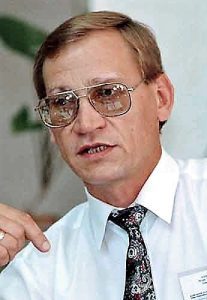
Igor Alexandrov
The attack on Alexandrov occurred on July 3, 2001. Crippled by the beatings, but still alive, he was sent to intensive care, and the incident shook the Ukrainian public. The wave immediately reached Kyiv itself (where Aleksandrov had his own friends and patrons from among the opposition), and Kuchma personally ordered that those responsible be brought to the people as soon as possible. The Donetsk prosecutor’s office and the Ministry of Internal Affairs understood this in their own way. Regional prosecutor Viktor Pshonka sent Alexander Medvedko to Slavyansk, who personally supervised the progress of the case. As the media reported, from the very first day Medvedko stalled the investigation in hot pursuit – which, however, the local police were not particularly zealous in pursuing. Moreover, Medvedko’s first initiative was to open a case under the article… hooliganism motivated by revenge. And only when Alexandrov died in the hospital on July 7, the case was reclassified as a murder. It received an even greater response, more than 800 prosecutors and police officers were involved in it, and Vladimir Golik, an investigator for particularly important cases, arrived from Kyiv. And then, according to a number of sources Skelet.Infoit was Medvedko who suggested that the investigator quickly “solve” the case by accusing some tramp or insane person of murder. The local police happily agreed and immediately arrested the homeless man Yuri Veredyuk. This poor fellow, who suffered from tuberculosis, was blamed for the murder of Alexandrov. It was reported that the Kiev investigator Golik tried to object, but Medvedko silenced him, then got Golik removed from the investigation.
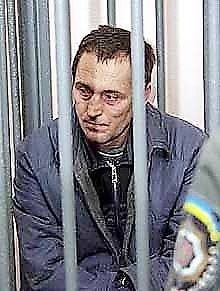
Yuri Veredyuk
This was done not only to clear away the direct perpetrators (members of the organized crime group “17th Precinct”), but to cover up the names of possible customers, among whom were the Bliznyuk family, the Pshonok prosecutor’s family, as well as businessman Alexander Leshchinsky – then known as the “vodka king of Donbass” “, and today owns the largest grain agricultural holding “Lauffer”. Leshchinsky waged a real war against Aleksandrov, and even tried, through the Donetsk prosecutor’s office, to prohibit him from engaging in journalistic activities.
It was reported that Medvedko was personally present at Veredyuk’s interrogation, that he personally witnessed his “confession” and considered the investigators’ conclusions correct – in general, the case was concocted under his direct supervision and was already preparing to be sent to court, when suddenly something went wrong usually, not as the Donetsk prosecutor’s office is used to. The public and the opposition in Kyiv called the investigation a farce, new facts were published in the media, and the falsifiers realized that they were one step away from a loud scandalous collapse. A new investigator of the Prosecutor General’s Office for Particularly Important Cases, Alexander Kalifitsky, arrived from Kyiv to Slavyansk – however,
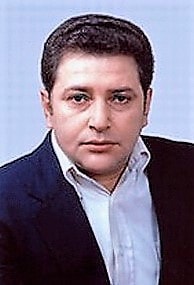
Alexander Leshchinsky
who had an even more corrupt reputation than Medvedko. He began to review the case – and the unfortunate Veredyuk suddenly died in his cell, at the same time two witnesses to the case and Andrei Ryabtsev, an employee of the Ministry of Internal Affairs who worked on it, died. Then Kalifitsky “exposes the falsifiers” who were declared to be the employees of the Slavyansk Regional Department of Internal Affairs, but at the same time allows Alexander Medvedko to “clean up the matter” and get himself out of harm’s way. After which Medvedko generally “ran away” from harm’s way: in early September 2001, he was transferred to Lugansk and appointed deputy regional proctor. Prosecutor General Potebenko personally translated, giving him a bonus in the amount of a month’s salary “for achieving results in the investigation” (order of Prosecutor General Potebenko dated September 10, 2001 No. 662-k).
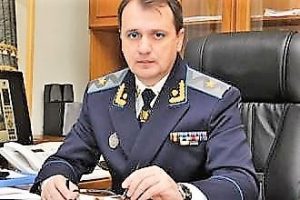
Alexander Kalifitsky
Note that future career of Kalifitsky himself was also very successful: in 2011 he became the prosecutor of the Ivano-Frankivsk region. From the very first days of work, he shocked local entrepreneurs with his “taxes” (starting from $50,000), thereby making a big contribution to the growing dissatisfaction with the “Donetsk regime.” But his son Nikolai Kalifitsky, who after the Maidan worked in the prosecutor’s office of the Lvov region, in 2017, he was caught taking a “ridiculous” bribe of 12 thousand hryvnia.
Intrigues of the State Prosecutor’s Office
In July 2002, the Verkhovna Rada showed rare unanimity, casting 350 votes for the new Prosecutor General Svyatoslav Piskun, whose candidacy should have satisfied everyone – both the government and the opposition. But none of the voters had any idea what kind of new Prosecutor General Truffaldino would turn out to be. He immediately took up a new investigation into the Gongadze case, which the opposition had long demanded from the authorities, making a whole show out of it: he gathered journalists, regularly organized press conferences with reports, made pompous speeches, even attracted a couple of “switchmen”, the largest of whom turned out to be General Pukach. But behind this violent imitation there was no real action; it only diverted the investigation from the question of those who ordered the murder of Gongadze, from the figures of Kuchma and his entourage. Piskun turned out to be a kind of prosecutor-Susanin, an unsurpassed master of leading high-profile cases into hopeless labyrinths and leading them there in circles, and doing all this publicly, openly.
Well, another such master helped him in this – Alexander Medvedko, who moved from Lugansk to the Prosecutor General’s Office a month before Piskun’s appointment, in June 2002.
He was appointed to the familiar position of head of the Department for Supervision of Compliance with the Law of Investigative Agencies, but already within the whole of Ukraine and with the rank of one of the Deputy Prosecutors General of Ukraine. It was rumored that he was dragged to the capital by Potebenko, who was leaving the Prosecutor General’s Office, with whom Medvedko was an old acquaintance, and not only in the Alexandrov case. Thus, Medvedko was inherited by Piskun, and he was directly involved in the simulation of the investigation into the murder of Gongadze.
Piskun’s Prosecutor General’s office did not last long. Firstly, he seriously quarreled with Yulia Tymoshenko, renewing criminal cases against her family (the UESU case), and BYuT angrily demanded his resignation, looking for any pretext. Secondly, with the appointment of Viktor Yanukovych as Prime Minister, the Donetsk people actively promoted their own man, Gennady Vasilyev, to the post of Prosecutor General. There were several other reasons, and as a result, in October 2003, Leonid Kuchma dismissed Piskun, replacing him with Vasilyev. And the first thing the new prosecutor general did was to get rid of Alexander Medvedko. This caused surprise: why did the “Donetsk” fire the “Donetsk”, especially since they literally worked together in the 90s (the city prosecutor Medvedko was directly subordinate to the regional prosecutor Vasilyev). Perhaps the reason was that Medvedko later worked too closely with Potebenko and Piskun, breaking away from his “Donetsk roots.” The semi-official reason was given as Medvedko’s involvement in the falsification of the Alexandrov case – after all, it was precisely then that, through the efforts of the opposition, this case became one of the main levers of pressure on the Donetsk people.
Alexander Ivanovich was not bored with nothing to do: he immediately got a job as the head of the legal department of Aviant (Antonov aircraft plant), organizing several financial scams there. He carried out one of them literally under the noise of the “Orange Revolution”, transferring 26.6 million hryvnia to four shell companies – after which both the companies and the money disappeared. The criminal case initiated on this occasion had no chance, because a few days later Medvedko was reinstated in the Prosecutor General’s Office.
This happened immediately after the efficient Piskun was restored to the post of Prosecutor General through the court, and Alexander Medvedko also returned with him – and no one remembered the Alexandrov case to him. Both began to diligently work out their return to the new government (so that they would not be fired again), and therefore they enthusiastically began investigating the circumstances of the death of ex-Minister of Transport Georgy Kirpa and former Minister of Internal Affairs Yuri Kravchenko. We took it to quickly close them.
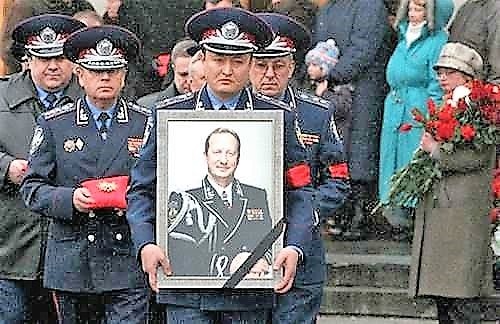
Funeral of Yuri Kravchenko
The case of Kirpa, who was found dead on December 27, 2004 at his dacha, was first opened under the article “incitement to suicide,” and already in January 2005 the investigation settled on the version of simple suicide, ceasing to investigate possible causes. Through the mouth of Prosecutor General Piskun and his deputies Viktor Shokin and Alexander Medvedko, it was stated that it was impossible to find any evidence to confirm the version of incitement to suicide. But the case of the death of Yuri Kravchenko, who allegedly committed suicide on March 4, 2005 at his dacha, lasted almost a year. The investigation’s version that Kravchenko committed suicide with two shots to the head was perceived by the public as a cruel joke. However, Ukrainian society, split in two, was then unable to develop a unified attitude towards this “suicide”, which allowed the Prosecutor General’s Office on December 27, 2005 to close case No. 47-642 on the death of Kravchenko, which was led by senior investigator for particularly important cases Lyubomir Viitovich, with with the wording “in the absence of a crime”. Sources Skelet.Info reported that Medvedko put a lot of effort into reducing both tragedies to a banal suicide, since it was he who was supposed to oversee the legality and objectivity of the investigation.
It is interesting that later, in 2007, Yuriy Lutsenko publicly expressed doubts about the suicide of Kirpa and Kravchenko. Moreover, then Lutsenko said he has some evidenceallowing him not to believe in the official version of the Prosecutor General’s Office. But when a few months later he again became Minister of the Interior, he forgot about this evidence. Lutsenko did not remember them when he became the Prosecutor General of Ukraine.

Alexander Medvedko: prosecutor general-grave digger of high-profile cases and his corrupt relatives. PART 1
Less notorious was the case of the “suicide” of banker Yuri Lyakh (a member of the SDPU (u), called the cashier of Viktor Medvedchuk), who was found dead in his Kiev office early in the morning of December 3, 2004 (at the height of the Maidan). Although 8 (!) stab wounds were found on his neck, the case ended with the “conclusion” of the investigation that Lyakh committed suicide – and a little later the Prosecutor General’s Office confirmed this version.
At the same time, Medvedko also worked on “commercial orders,” that is, he saved embezzlers, embezzlers, and swindlers from criminal liability. So, in May 2005, Alexander Kirilenko, the stepson of the Ukrainian diplomat Andrei Kuzmenko, the representative of Ukraine in the Council of Europe, approached him (in 2014, by Poroshenko’s decree, he was appointed Chargé d’Affaires of Ukraine in the UK). Kirilenko was accused under several articles of the Criminal Code (191, 209, 358), including for causing damage to the state in the amount of 800 thousand hryvnia, and was already drying crackers, when suddenly he was given a “date” with Medvedko. Kirilenko was soon arrested by the SBU, but during interrogation he almost cursed at the investigators, declaring that he had already “decided everything at the top.” A few days later, the Prosecutor General’s Office requested his case, and a few days later Kirilenko was released.
At the same time, the SBU, with the help of a bug, managed to catch Medvedko’s trusted person, deputy head of the investigation department of the Prosecutor General’s Office, Vyacheslav Ryabenko, receiving a bribe (by the way, he oversaw the Kirilenko case). As it turned out, Ryabenko played the role of Medvedko’s “cashier”; it was through him that all bribes and kickbacks passed, which allowed the cautious Medvedko to remain formally clean before the law. When Ryabenko found out about the wiretapping, he ran to the boss to cry into the general’s vest, but he calmed him down: they say, even if they open a case, it will end up in the Prosecutor General’s Office anyway. And so it happened: the SBU handed over the material on Ryabenko to Prosecutor General Piskun, but he “lost” it.
Sergey Varis, for Skelet.Info
CONTINUED: Alexander Medvedko: the prosecutor general-gravedigger of high-profile cases and his corrupt relatives. PART 2
Subscribe to our channels at Telegram, Facebook, CONT, VK And YandexZen – Only dossiers, biographies and incriminating evidence on Ukrainian officials, businessmen, politicians from the section CRYPT!








